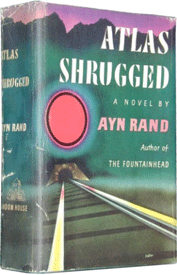If, as would appear, Miss Ayn Rands purpose in this book was to establish the thesis that the dollar sign is the holiest of symbols, that the profit motive is the only human impulse capable of sustaining a decent society, it would have been more honest and more effective to write a long essay, or a series of essays, rather than involve the reader in an interminable tale about railroading and heavy industry.
For this reading marathon is really not a novel but a tract. One might even say that by trying so desperately to be a novel, it has missed its only possible vocation in the domain of fiction: to be a long-lived comic strip. If Miss Rand would draw it instead of writing it, there are materials here to outlast Kerry Drake or Buz Sawyer or many of the other perennials of the daily papers.
The action takes place in a future America, not chronologically situated, but characterized by a general decline in standards of production and of living. The political structure of our country has undergone such change as seems implied in the designation "Head of State" given to the chief executive, and in the power over every phase of activity exercised by a morbidly multiplied bureaucracy.
Perspectives are much altered between now and that time. Of our present preoccupation with the dangers of catastrophic conflict between Communist and non-Communist ideologies, not a trace remains in Miss Rands shabby new world. The hope that our time places in the development of atomic energy is, presumably, a flash in the pan, since in this version of things to come there is not even mention of the atom, and motive power and energy are still sought in the good old-fashioned resources of oil and even coal.
The United States, last outpost, together with one or two South American republics, of a kind of capitalism, is unrecognizably down-at-heels. But her dinginess is a horn of plenty compared with the misery of the Peoples States to which socialism has degraded the rest of the world. These wretched countries survive at all only by handouts which America still contrives to give them from her own insufficiency.
That things have come to such a pass is due, we learn, not to the corruption and ineptitude of the leadership, nor even to the defeat of creative initiative by the hopeless bureaucratic confusion. These ills are mere symptoms of the deeper-lying cancer which, century after century, has been preparing society for utter collapse. The real villain of the piece is the concept, fostered over millennia by philosophy and religion, that human society must (or even can) be based on altruism.
The author indicts bv name the secular version of this view as summarized in the Marxian dictum: "From each according to his abilitv, to each according to his need." But by implication at least the Judeo-Christian "Thou shalt love thy neighbor as thyself" must be judged even more pernicious. Miss Rand establishes the validity of her thesis by setting up so outrageous a caricature of altruistic society that it is possible for the heroine of the story to observe, with reason: "What motive is the opposite of charity? Justice!"
The remedy to the calamitous plight of the world, the only hope for human survival, lies in acknowledgment of self-interest as the only healthy motivation in mans life. The program is summed up in the oath taken by the few cognoscenti who, in the story, may yet save the world for a new era of light: "I swear by my life and my love of it that I will never live for the sake of another man, nor ask another mall to live for mine."
Having spent so much space trying to analyze the theme of this book, there is little left in which to indicate its plot, of which there is a great abundance. The central figure is a youngish female executive who tries to run the remains of a great railroad system in the midst of the disintegrating economy already indicated. Her dealings with the corrupt, the weak, the greedy and the incompetent who make up most of her entourage, and with a handful of surviving honest and capable industrialists, constitute the fabric of the narrative, moving forward from disaster to catastrophe. Every few hundred pages, as if in a concession to the depravity of public taste, this good lady indulges in some unpleasant dalliance with the gigantic captains of industry. This is all quite out of character, since Miss Dagny Taggart seems to be made of stainless steel with carbolic acid performing the function of blood in her circulatory system.
Miss Rand has a certain gift for dialog, particularly the ill-tempered sort. But most conversational exchanges in the book take the form of speeches. One tycoon, in an impromptu aside to a little group of guests at a large wedding party, talks non-stop for five pages on the virtues of money. The record is held by another who lasts, albeit on the radio, for full sixty pages on, inter alia, what he asserts to be the error in the doctrine of original sin.
In a kind of epilog, the author remarks that readers who had questions about her earlier work, The Fountainhead, will find them answered in the present novel. If Miss Rand was hinting thereby that, conversely, one should look in The Fountainhead for clues to obscurities in Atlas Shrugged, this reader, who has not read the first book, declines to take the hint. Eleven hundred and some pages will be quite enough for now, thank you.








